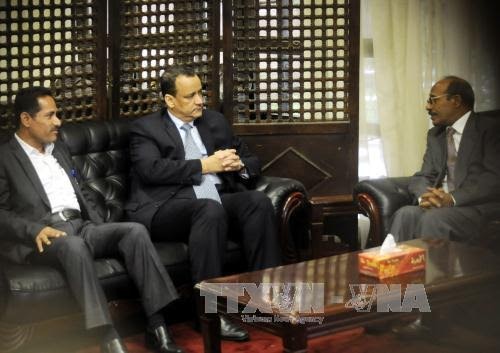(VOVworld)- The UN-brokered peace talks in Yemen are at risk of failing. Yemen’s Houthi rebels have rejected a new UN proposal to continue talks and demand for a unity administration. Recent tensions in Yemen have made the plan to establish peace in this country more hopeless.

UN Special Envoy for Yemen Ismail Ould Cheikh Ahmed (in the middle) in Sanaa, Yemen on July 14 (Photo: THX/TTXVN) |
The crisis in Yemen could be described as an expanded civil war. Instability in Yemen is likely to continue since all peace talks have failed despite being mediated by the Arab League and the UN. Yemen has been fallen into chaos following the coup against President Aloi Abdullah Saleh in 2012. Fighting in Yemen has killed thousands of Yemenis. The new UN proposal which was released after months of negotiations in Kuwait demands that Houthi rebels withdraw from Sanaa, Taez, and Hodeida, and hand over the weapons they looted from military depots within 45 days. The proposal is intended to replace the peace roadmap previously initiated by Ismail Ould Cheikh Ahmed, the UN Special Envoy for Yemen. Under the roadmap, Mr. Ahmed proposed to set up a unity administration that includes insurgents with whome President Abd Rabbu Mansour Hadi disagreed. The Yemeni government agreed to the new UN proposal, but Houthi rebels rejected the proposal saying that to create peace, it’s necessary to set up a unity administration with a new President and a new government.
Earlier, a number of UN-sponsored peace talks had become deadlocked due to differences between involved parties. Houthi rebels insisted that any agreement must first tackle their demand for a unity administration but the Yemeni government wanted to implement the UN Security Council resolution which required the Houthi and their allies to withdraw from the regions they have occupied since 2014, including Sanaa, and hand over heavy weapons.
Tension has become worse since July 28, when Houthi rebels and their ally – the General People’s Congress Party of former President Ali Abdullah Saleh announced they will set up a “Supreme Council” to govern the country. The Yemeni government described the act a “new coup” and said it would not negotiate. Clashes between Yemeni soldiers and Houthi rebels continue to inflict casualties.
Religious conflicts
The situation in Yemen is complicated due to religious conflicts. As in other Middle-Eastern countries, in Yemen, conflicts between Shiite and Sunni continue because of different understandings about the successor of the Prophet Mohammad. Most Yemenis are Muslims but they are either Shiite or Sunni Muslims. The conflict between the two sects became more complicated in 2009 when Yemen became a base for Al Qeada, whose ideology supports the Sunni sect. Houthi rebels are the Shiite. As a result, Yemen became a battle between government troops and Houthi and Al- Qeda forces.
Houthi rebels have confronted the government since 2009. In 2011, President Ali Abdullah Saleh was overthrown and Mr. Abd Rabbu Mansour Hadi took over. In January 2015, Houthi rebels forced President Hadi to resign. A month later, the escalated conflict in Yemen forced Mr. Hadi to go to Aden in southern Yemen and then to Saudi Arabia. On March 25, the allied troops of 10 Gulf and Arabian countries launched air strikes to prevent the Houthi from moving south. Since then, Yemen has been mired in conflict.
Despite efforts by the international community led by the UN, parties in Yemen have failed to find a common voice on a transitional government. Peace and stability have not yet returned to Yemen.